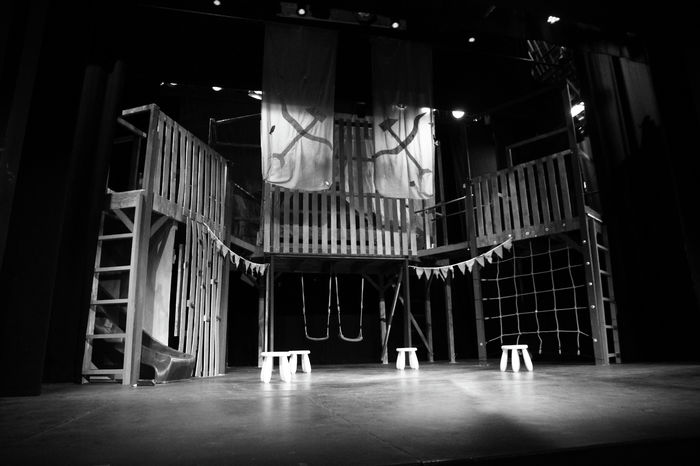The Rise And Fall of Little Voice: Giving a big voice to Northern theatre
Georgie Deri and Rebecca Mayer, Director and Producer of the upcoming production of The Rise and Fall of Little Voice, discuss the importance and challenges of bringing Northern voices to the ADC stage.

The Rise and Fall of Little Voice is Lancashire born Jim Cartwright’s sixth play. Despite their differences, all his world-renowned works share one thing in common: the insistence on the setting being “A Northern Town”. Cartwright defends this decision as an act of protest, demonstrating the utter destruction inflicted upon all Northern towns, an inconvenient truth that remains forgotten by those who sit in power.
However, with this comes a danger that is now increasingly more relevant than ever and is important to address. This is the risk of stereotyping “The North” as one single entity when in reality, this couldn’t be further from the truth. The starkest example of this in action comes, ironically, from the acclaimed 1998 film adaptation, Little Voice. Originally set in Manchester, yet filmed in Scarborough, North Yorkshire, characters speak with thick, Lancastrian accents despite existing in a clearly Yorkshire setting. No one ever questions it, yet something doesn’t add up. Although Manchester and Scarborough are 115 miles apart, their individual identities, voices and landscapes have been clumped together into one word: “Northern”.
Despite this, the 1998 film became something of a legend to Scarborough and the massive boost to the economy through tourism is now commonly referred to as the “Little Voice effect”. But for a small, forgotten, Northern town, this fame was too good to be true. Unsurprisingly, many of the iconic buildings used during the filming have since been demolished or converted into expensive holiday lets. Scarborough, like many other Northern towns, is losing its identity, its humanity, being erased piece by piece in the pursuit of profit. That’s why presenting these forgotten places to an audience, giving them a bigger voice, has become more important than ever.
"Despite years of suffering and hardship, still the North persists."
In spite of all the famed highlights and glittering successes of Cartwright’s career, he has always remained true to his roots. Most recently in Malton, North Yorkshire, he is overseeing the production of his latest play in a venue that would be dwarfed by the National Theatre. He could be in London. He could be at home, counting royalty cheques. Instead, he’s in Malton, writing a new play for a new venue. Why? “It’s passion,” he says, “it’s the power of passion.”
Becca: As a Geordie lass, I can’t tell you how refreshing it is to see narratives other than the traditional drawing-room drama being performed at the ADC. Northern representation in Cambridge is something I feel really passionate about, and so to address that issue through the medium of theatre is a dream come true.
Georgie: It was when I read the line “what a championship neet” in the script that I knew we had to get this play on the ADC stage. Hearing a regional accent in a normalised light in theatre is something surprisingly rare, often being reserved for the lower status character, the butt of the joke or the comedic relief. I’ve started calling it “token regionalism”. Because it’s not just classist, I think it goes so much deeper than that. Accent is such a huge part of identity; therefore these decisions are in a way subconsciously cementing the Northern identity as inferior.
Becca: The story of Little Voice, a Northern girl struggling to find her own identity in an extremely noisy world, is something I strongly relate to, and I hope that her tale inspires others like myself to look beyond the confines of their background and to forge their own path.
Georgie: Coming from the forgotten Northern seaside town of Bridlington, 30 minutes from Scarborough where the film was shot, this play speaks so much truth to me. Bringing characters to life that are complex, passionate and unapologetically Northern has been a great joy. Let this play then serve as a reminder that there is more to life outside the M25, that extraordinary things can happen in seemingly ordinary places, that despite the years of suffering and hardship in the North, humanity persists.
Funny, brutal, beautiful and sad, don’t miss Jim Cartwright’s timeless and ultimately uplifting tale about finding your voice in a noisy world.
The Rise and Fall of Little Voice plays at the ADC Theatre from 28th January to 1st February.
 News / News in Brief: Postgrad accom, prestigious prizes, and public support for policies11 January 2026
News / News in Brief: Postgrad accom, prestigious prizes, and public support for policies11 January 2026 Comment / Will the town and gown divide ever truly be resolved?12 January 2026
Comment / Will the town and gown divide ever truly be resolved?12 January 2026 Comment / Plastic pubs: the problem with Cambridge alehouses 5 January 2026
Comment / Plastic pubs: the problem with Cambridge alehouses 5 January 2026 Lifestyle / The only party girl in the East Midlands12 January 2026
Lifestyle / The only party girl in the East Midlands12 January 2026 News / 20 vet organisations sign letter backing Cam vet course13 January 2026
News / 20 vet organisations sign letter backing Cam vet course13 January 2026









